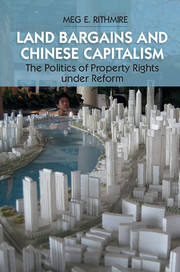Book contents
- Frontmatter
- Dedication
- Contents
- List of tables
- List of figures
- Acknowledgments
- List of Abbreviations
- Glossary
- 1 Property and Politics in China
- 2 The Making of the Real Estate Economy: Urban Reform and the Origins of the Party's Land Dilemma
- 3 The Political Economies of China
- 4 “Land as a State Asset”: Global Capital and Local State Power in Dalian
- 5 Property Rights and Distributive Politics: Urban Conflict and Change in Harbin, 1978 to the Present
- 6 Changchun Motor City: The Politics of Compromise in an Industrial Town
- 7 Conclusions
- Bibliography
- Index
3 - The Political Economies of China
Published online by Cambridge University Press: 05 November 2015
- Frontmatter
- Dedication
- Contents
- List of tables
- List of figures
- Acknowledgments
- List of Abbreviations
- Glossary
- 1 Property and Politics in China
- 2 The Making of the Real Estate Economy: Urban Reform and the Origins of the Party's Land Dilemma
- 3 The Political Economies of China
- 4 “Land as a State Asset”: Global Capital and Local State Power in Dalian
- 5 Property Rights and Distributive Politics: Urban Conflict and Change in Harbin, 1978 to the Present
- 6 Changchun Motor City: The Politics of Compromise in an Industrial Town
- 7 Conclusions
- Bibliography
- Index
Summary
The three provinces that constitute the northeastern region of China (Dongbei) are not the most obvious places in which to study land politics and property rights, particularly for a political scientist. The land conflicts that have escalated and attracted international attention, such as the case of Wukan discussed in Chapter 1, most frequently have occurred in the southeast in the Pearl River Delta region or in the Yangzi River Delta region. These areas are the most urbanized in China, comprising agglomeration regions where large urban centers are separated, if at all, by increasingly sparse rural areas. By contrast, the constellation of cities in the Northeast today is much the same as it was thirty years ago. The region has attracted the attention of scholars interested in unemployment and labor politics in China, but land, for the most part, has not figured into the narrative of the rise and fall of China's rust belt.
Yet, I propose we can learn more about land politics and conflict over property rights in reform-era China from a controlled comparison of Northeastern cities than from either single case studies or treating “China” as a single unit of analysis. To be sure, other studies have identified and explained variation in patterns of land conflict, examining how differently situated urban, periurban, and rural residents interact with state land policies and whether citizens pursue distributive or procedural justice claims in response to threats to their land rights. Yet, few studies – if any – have attempted to explain variation in the approaches that different local governments adopt toward land property rights. Indeed, a longitudinal analysis of the use of land as a political resource in the three cities in this study uncovers two critical processes that have heretofore been absent from discussions of land politics. First, the controlled comparison reveals that very different subnational property-rights regimes emerged in the 1980s and 1990s as land markets were liberalized and land-use rights were commodified. This finding is the subject of the following three chapters. Second, the longitudinal comparison also reveals a national shift in land politics, after which most urban governments throughout the country adopted a predatory and expansionist approach to land. I return to this second insight in the conclusion.
- Type
- Chapter
- Information
- Land Bargains and Chinese CapitalismThe Politics of Property Rights under Reform, pp. 66 - 82Publisher: Cambridge University PressPrint publication year: 2015



